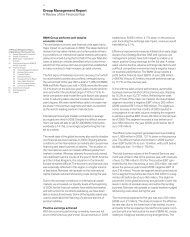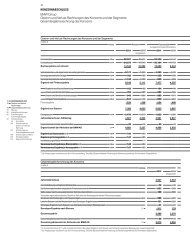Global Compact Case Study 2002 - BMW Group
Global Compact Case Study 2002 - BMW Group
Global Compact Case Study 2002 - BMW Group
You also want an ePaper? Increase the reach of your titles
YUMPU automatically turns print PDFs into web optimized ePapers that Google loves.
<strong>BMW</strong> CleanEnergy Project.<br />
<strong>Global</strong> <strong>Compact</strong> <strong>Case</strong> <strong>Study</strong> <strong>2002</strong>.<br />
What have we learned?<br />
One thing the <strong>BMW</strong> <strong>Group</strong> learned from this research is: The public demand is<br />
very high for government and policies to create stable and reliable framework<br />
conditions for such an innovative approach to a sustainable mobility for the<br />
future.<br />
Besides the normal challenges that occur in such a project that includes partners<br />
which are partly competitors, the key technical challenges remaining are<br />
concerning the implementation of the infrastructure. One of the challenges being<br />
the so-called ”chicken-or-egg-discussion”: Whereas the oil industry will not<br />
commit to building the hydrogen infrastructure without the commitment of the<br />
car manufacturers to introduce a significant amount of hydrogen-fuelled vehicles<br />
to the market, in return the automobile industry will not commit to produce such<br />
vehicles in large numbers without having the necessary infrastructure to provide<br />
fuel. However all industries involved require certain long-term stability with regard<br />
to the political framework to be able to plan for the decades ahead.<br />
The biggest obstacle still to overcome is likely to be the costs. One could<br />
compare the development stage of hydrogen as a fuel with the development of<br />
the combustion engine at the time of its first application in an automobile. On the<br />
one hand hydrogen as a fuel for automobiles is very much in its infancy and on<br />
the other hand the current infrastructure is completely implemented to support<br />
fossil fuels. This means that only with a broad alliance of all parties involved -<br />
research, production, finance, insurance and policy can a shift in technology be<br />
achieved, which will be a feasible and convenient alternative for our customers.<br />
Another thing that we learned about the challenges and successes in working to<br />
diffuse this technology came as we went along with the <strong>BMW</strong> CleanEnergy<br />
Project: From our research activities as well as from the different awareness<br />
actions like discussions, presentations, exhibitions, brochures, requests for<br />
information and last but not least the <strong>BMW</strong> CleanEnergy WorldTour we learned<br />
that there is an immense need for information about this technology. This lead us<br />
to create – together with educationalists – didactic learning material for schools,<br />
describing the whole context of the CleanEnergy-System. This material is<br />
currently available in German, English and Mandarin language versions.<br />
<strong>BMW</strong> <strong>Group</strong>


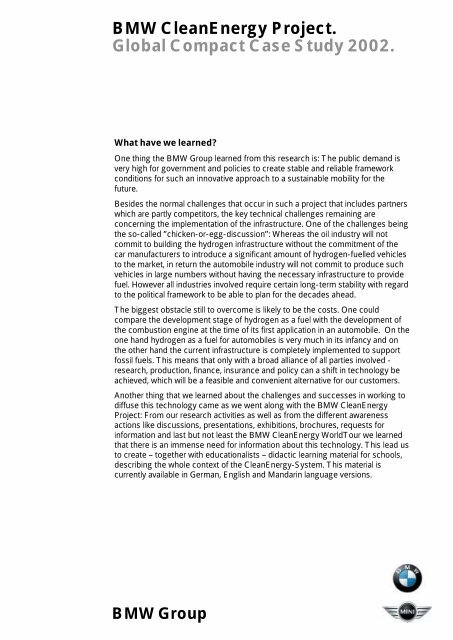
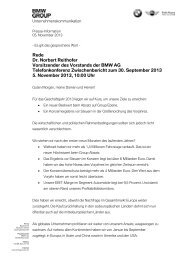
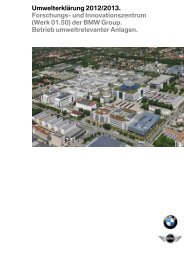
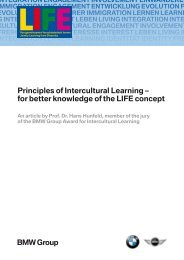
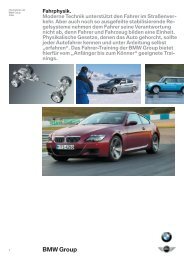
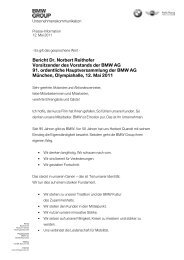
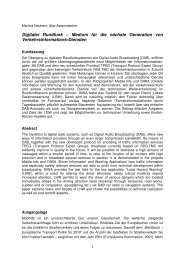
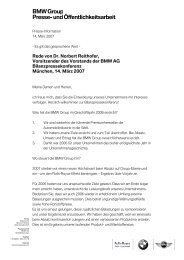
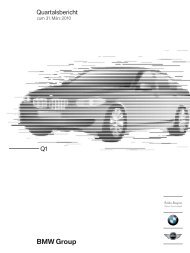
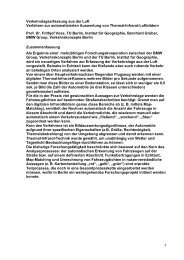
![Vollständiger Bericht [PDF] - BMW Group](https://img.yumpu.com/20706531/1/190x238/vollstandiger-bericht-pdf-bmw-group.jpg?quality=85)



